
drill
Originally uploaded by erulke.

The phrase "Banya Bashi" means "many baths" in Turkish. The mosque (1576) is situated in the centre of Sofia, a remnant of the Ottoman rule of Bulgaria that lasted nearly five centuries. It`s a part of the "religious triangle" - the St Nedelya church, the Banya Bshi mosque and the Sofia Synagogue, just 100m from one another.
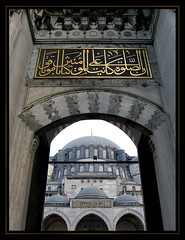
Suleymaniye Mosque
It was built on the order of sultan Suleiman I (*Suleiman the Magnificent 1495-1566) and was constructed by the great Ottoman architect Mimar Sinan. The construction work began in 1550 and the mosque was finished in 1557.

It was commissioned by Sultan Ahmet the 1st on the square with the same name in Istanbul between 1609 and 1616. Its architect is Sedefkar Mehmet A?a. It’s the only mosque in Turkey with six minarets. The mosque part has dimension of 64x72. The diameter of its central dome has a diameter of 33.4 m and a height of 43 m and is 2.6 m greater than that of St. Sophia. The interior of the mosque is illuminated by 260 windows. Since it is beautifully adorned by blue, green and white encaustics, it was named by the Europeans as “Blue Mosque”. The inscriptions are made by Seyyid Kas?m Gubari of Diyarbak?r. It makes up a complex with the surrounding buildings.
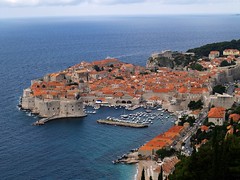
This walled City was described by Lord Byron as "The Pearl of the Adriatic".
The town was founded in the 7th century on a site called Ragusium by the Romans. It was under the protection of the Byzantine Empire between 867 and 1205, of Venice until 1358, of Hungary until 1526, and of the Ottoman Empire until 1806, but remained largely self-governing as an independent republic. In the 16th century Dubrovnik had one of the greatest merchant fleets in the Mediterranean, and it remained the chief cultural centre for the South Slavs until the 19th century. Napoleon abolished the city-republic of Dubrovnik in 1808, and the Congress of Vienna ceded the town to Austria in 1815. By the terms of the Treaty of Rapallo (1920) following World War I, the town became part of the newly created Kingdom of the Serbs, Croats, and Slovenes (later Yugoslavia). During World War II Dubrovnik was occupied by Italian and German forces. In 1991, when Croatia declared its independence from Yugoslavia, Serbian forces laid siege to and bombarded the town, destroying many sites of historical importance. It has now been fully restored to its former Glory.
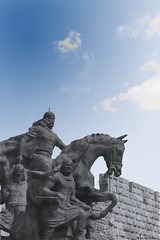
Saladin or Salah al-Din Yusuf (c. 1138 - March 4, 1193), Sultan of Egypt and Syria, was an illustrious twelfth century Muslim general and warrior from Tikrit, in present day northern Iraq. He founded the Ayyubid dynasty of Egypt, Syria, Yemen (except for the Northern Mountains), Mesopotamia, Mecca, Hejaz and Diyar Bakr. Although he is known worldwide as Saladin his real name was Yousuf (Joseph in Latin).
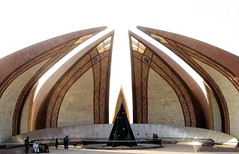
Pakistan's new National Monument was built in the Shakarparian Hills, at the west viewpoint overlooking the capital city Islamabad, Pakistan.
Built with expensive red granite marble the shape is that of a blossoming flower, with petals.
The four main petals of the monument represent the four provinces of Pakistan: Balochistan, North West Frontier Province, Punjab, and Sindh. In the large view you can see some murals of famous monuments which are located in the respective provinces. And the three smaller petals represent the Northern areas, Kashmir and the country’s tribal areas.
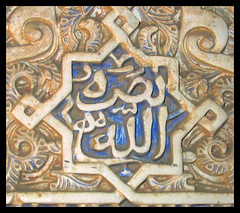
More on the Islamic eight point star! This detail in stucco is from the Salon de Embajadores (Ambassador's Room) in the Alhambra in Granada, Spain. This is where the Muslim ruler received senior dignatories and is the grandest room with a high ceiling and stunningly decorated walls. It is also the most dimly lit room and as a result has preserved some of the colours. Again, you see all the three elements of Islamic art here: geometrical patterns, vegetal patterns, and Arabic calligraphy. The calligraphy is simple stuff and is just two words, literally, Help (top) and God (bottom). I'm of the view that perhaps no building in the world has the word God or Allah inscribed on it as many times as in the Alhambra. The last Muslims rulers of Spain, the Nasirids, were well aware of their position and, I think, decorated the Alhambra fittingly: imploring God for His help and protection. Everyone interpretes the Alhambra as royal palace, a secular place, but it is, I believe, a masterpiece of the Sufi artists and a significant piece of Islamic religious architecture and decoration. The Nasirids held on until 1492 and the years that followed saw the holocaust of Muslims in Europe. Today, the witch-hunt or Islamophobia continues in other guises.
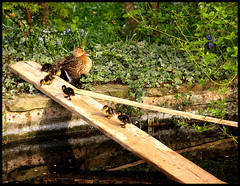
Final one in the "Cambridge mums" series! A different kind of mum here. Saw this family in Pembroke College. Loved the way the chicks were going up the plank of wood. I didn't hang around to see them sliding down:-)
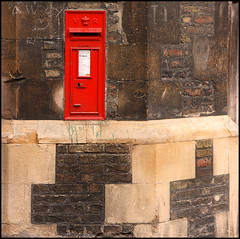
Letter box on the side of Queens' College, Cambridge.
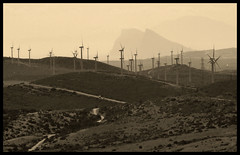
This is a little distance in from the Andalucian coast near Estepona as you can see The Rock, Gibraltar, in the distance. The Muslim general Tariq bin Ziyad landed here in 711AD and Gibraltar is named after him: Arabic "Jabal Tariq" which is literally Mount Tariq.
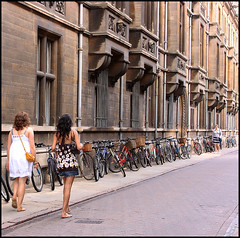
I can't understand why people ruin my photo's by stepping right in front of me! Such an amazing street -- Trinity Street, Cambridge -- and such a brill line up of student bicyles and these chicks just mess it all up:-) Anyway, the year's over and it's time to chill. It was Sunday -- Suicide Sunday -- and these girls were just unwinding after the exams. However, they might be unwinding, but they wind up the boys:-)
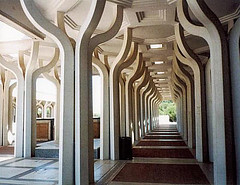
Roma! An old shot (scan) of my visit to the new mosque in Rome. Here's my column on the trip:
www.dailytimes.com.pk/default.asp?page=story_18-9-2002_pg3_5 . Here's an extract: "What makes this mosque special is the combination of Roman and traditional Islamic elements. A striking feature of the mosque is the palm tree-like columns, which are said to be reminiscent of the date palms of the first mosque in Madinah. The dendritic canopy also gives the impression of hands raised in prayer. In an article on the new mosque, James Steele explains that Portoghesi feels that there is no better symbol than the tree with which to express the diversity inherent in the unity of Islam. “The roots, trunk, branches and leaves of the tree, like the various countries in which Islam prevails, are all different, and yet work together as a complete organism"."
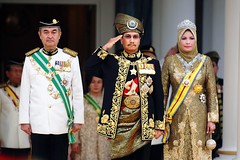
Duli Yang Maha Mulia Al Wathiqu Billah, Al-Sultan Mizan Zainal Abidin Ibni Almarhum Al-Sultan Mahmud Al-Muktafi Billah Shah Al-Haj (Center) is the 16th Sultan of the state of Terengganu, Malaysia, and the 13th Yang di-Pertuan Agong, or King, of Malaysia. He is the constitutional head of state of Malaysia.

The Eyüp Sultan Mosque is situated outside the Walls of Constantinople, near the Golden Horn, in the district of Eyüp on the European side of İstanbul. It was built in 1458 and is the first mosque which was constructed by the Ottoman Turks following their conquest of Constantinople (İstanbul) in 1453. The holiest site in Istanbul as well as one of the most sacred places in the Islamic world, the Eyüp Sultan Mosque was erected by Mehmet the Conqueror over the tomb of Halid bin Zeyd Ebu Eyyûb (known as Eyüp Sultan), the standard-bearer for the Prophet Mohammed as well as the last survivor of his inner circle of trusted companions. It is popularly accepted that while serving as commander of the Arab forces during the siege of 668 to 669, Eyüp was killed and buried on the outskirts of the city. One of the conditions of peace after the Arab siege was that the tomb of Eyüp be preserved.

My blog is worth $4,516.32.
How much is your blog worth?